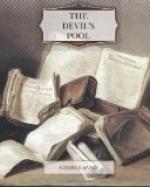To speak accurately, this song is only a sort of recitative, broken off and taken up again at pleasure. Its irregular form and its intonations, false according to the rules of musical art, make it impossible to reproduce. But it is a fine song none the less, and so entirely appropriate to the nature of the work it accompanies, to the gait of the ox, to the tranquillity of rural scenes, to the simple manners of the men who sing it, that no genius unfamiliar with work in the fields could have invented it, and no singer other than a cunning ploughman of that region would know how to render it. At the time of year when there is no other work and no other sign of activity in the country than the ploughing, that sweet and powerful chant rises like the voice of the breeze, which it resembles somewhat in its peculiar pitch. The final word of each phrase, sustained at incredible length, and with marvellous power of breath, ascends a fourth of a tone, purposely making a discord. That is barbarous, perhaps, but the charm of it is indescribable, and when one is accustomed to hear it, one cannot conceive of any other song at that time and in those localities that would not disturb the harmony.
It happened, therefore, that I had before my eyes a picture in striking contrast with Holbein’s, although it might be a similar scene. Instead of a sad old man, a cheerful young man; instead of a team of thin, sorry horses, two yoke of four sturdy, spirited cattle; instead of Death, a lovely child; instead of an image of despair and a suggestion of destruction, a spectacle of energetic action and a thought of happiness.
Then it was that the French quatrain:
“A la sueur de ton visaige,” etc.,
and the O fortunatos——agricolas of Virgil, came to my mind simultaneously, and when I saw that handsome pair, the man and the child, performing a grand and solemn task under such poetic conditions, and with so much grace combined with so much strength, I had a feeling of profound compassion mingled with involuntary respect. Happy the husbandman. Yes, so I should be in his place, if my arm should suddenly become strong and my chest powerful, so that they could thus fertilize nature and sing to her, without my eyes losing the power to see and my brain to understand the harmony of colors and sounds, the delicacy of tones, and the gracefulness of contours,—in a word, the mysterious beauty of things, and, above all, without my heart ceasing to be in relation with the divine sentiment that presided at the immortal and sublime creation.




